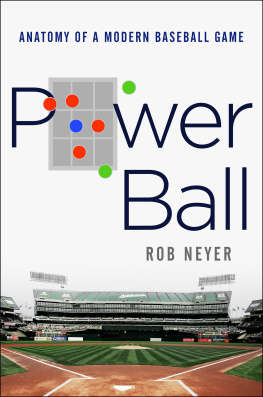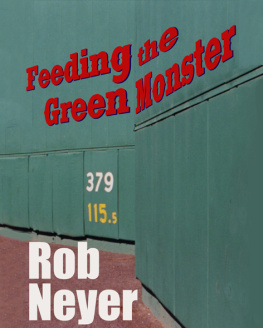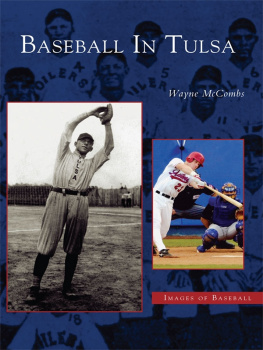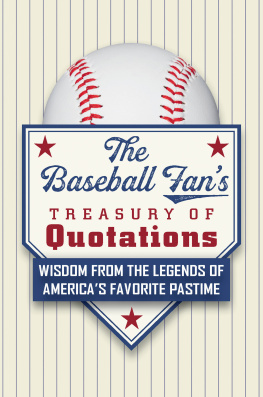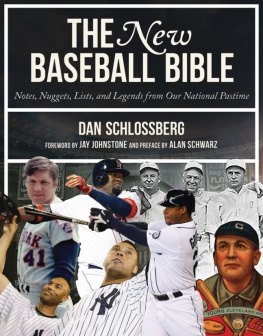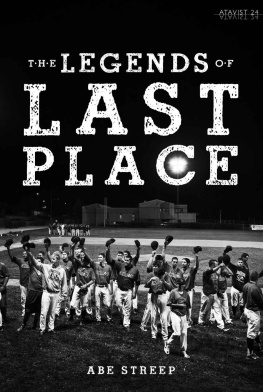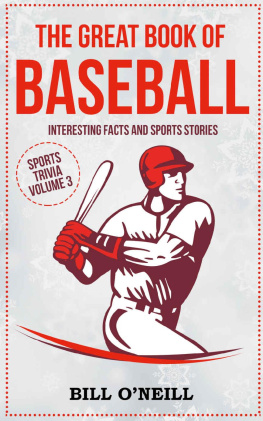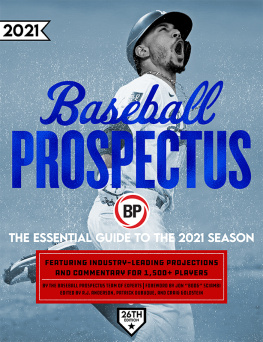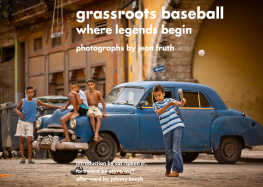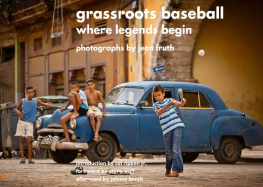
ALSO BY ROB NEYER
Baseball Dynasties: The Greatest Teams of All Time
(with Eddie Epstein)
Feeding the Green Monster
Rob Neyers Big Book of Baseball Lineups
The Neyer/James Guide to Pitchers
(with Bill James)
Rob Neyers Big Book of Baseball Blunders
ROB NEYERS
BIG BOOK OF
BASEBALL
LEGENDS
THE TRUTH, THE LIES, AND EVERYTHING ELSE
ROB NEYER
A FIRESIDE BOOK
PUBLISHED BY SIMON & SCHUSTER
NEW YORK LONDON TORONTO SYDNEY

Fireside
A Division of Simon & Schuster, Inc.
1230 Avenue of the Americas
New York, NY 10020
www.SimonandSchuster.com
Copyright 2008 by Rob Neyer
All rights reserved, including the right to reproduce this book or portions thereof in any form whatsoever. For information address Fireside Subsidiary Rights Department, 1230 Avenue of the Americas, New York, NY 10020
FIRESIDE and colophon are registered trademarks of Simon & Schuster, Inc.
Designed by Ruth Lee Mui
Library of Congress Cataloging-in-Publication Data
Neyer, Rob.
Rob Neyers big book of baseball legends : the truth, the lies, and
everything else / Rob Neyer.1st Fireside Trade pbk. ed.
p. cm.
1. BaseballAnecdotes I. Title. II. Title: Big book of baseball legends.
GV873.N493 2008
796.357dc22 2007049973
ISBN-13: 978-1-4165-6491-1
ISBN-10: 1-4165-6491-8
eISBN-13: 978-0-7432-8490-5
This book is for my grandparents, Connie Ivester and Gene Neyer.
Ive never doubted a single word of your stories.
CONTENTS
S HOULDERS OF G IANTS
Taken from the Pages of SABR Journals
T HE G LORY OF H IS E DITING
The Hidden Genius of Lawrence S. Ritter
1932 W ORLD S ERIES
When the Babe Did Something
ROB NEYERS
BIG BOOK OF
BASEBALL
LEGENDS
FOREWORD
by Bill James
I have always been fascinated by the notion that for thousands of years humans had absolutely no knowledge that there had ever been such a thing as a dinosaur. Even when I was a kid in the middle of the twentieth century, dinosaurs were kind of a remote concept. We were taught in grade school that they had all killed each other off in gun battles and then miraculously liquefied into gasoline, which at that time was like twenty-nine cents a gallon because dinosaurs were huge. Nowadays, though, your average four-year-old has 208 little plastic replicas of different kinds of dinosaurs and knows the names of nineteen different species before he goes to kindergarten.
Mommy, have you seen my stegosaurus?
Which one is that, dear?
You know, the stegosaurus. Its green, it has these things that stick up off its back. Looks kinda like a centrosaurus.
Is that the one in the bathroom?
Mom! Thats a triceratops. It doesnt look anything like a stegosaurus.
To the people who first realized that these overgrown armadillos had once roamed the earth and downtown Cleveland, the extent to which this knowledge has grown and spread throughout our culture would be beyond comprehension. It is such a strange idea, that knowledge of the past can be createdand yet it can be and is every day.
We used to call these Tracers I dont know what Rob is calling them now. Wed pick up a story -in an old book or out of an old newspaper, occasionally by interviewing an old ballplayer, and wed try to backtrack on it, find out what had really happened, back when dinosaurs roamed the box scores. This was before Retrosheet, before you could search through 10 million old newspapers on the Internet. This was before the Internet, really, before the Internet had escaped from Al Gores dungeon and invaded our living rooms, waving pictures of naked college girls. It was hard work, in those days, to figure out whether something had really happened. A lot of times you could narrow a story down to three or four seasons, figure that it had to have happened when the Browns were playing the Tigers, make up a list of seventy or eighty games, and head for the microfilm library. Youd be there for several days.
Organized knowledge about baseballs past has exploded so phenomenally, in the last twenty years, that to backtrack on most anecdotes no longer qualifies as research. I work in baseball now. Occasionally I run into some old ballplayer who has no idea how easy it is to check these things out, and he tells me about the time he threw out three runners at third base in the same game, or the time he hit a grand slam off of Mickey Lolich in Shea Stadium just before a cloudburst would have sent everybody home drenched but still tied. By occasionally I mean about three times a week. Pricking their bubbles would be rude. Any one who owns a computer can now find out in seconds things about Bob Gibson in 1968 that Bob Gibson himself didnt know at the time, couldnt have dreamed of knowing.
This explosion of knowledge about the past, roaring up from behind us, exposes every exaggeration, every fictionalization, every enhancement, every substitution. Its a little sad. Paper-thin lies, once protected by layers of darkness, are now transparent in the glare. We know now that it wasnt Mickey Mantle in the batters box, it was Roger Repoz, and it wasnt the ninth inning, it was the fourth, and the bases werent loaded, and the score wasnt tied, and the frog did not become a prince.
Accuracy is a prickly concept for the modern quasi-journalist. Everybody is certain that he is more accurate than the other guy is. God forbid that anyone should think that I am speaking against accuracy in journalism, but something is happening here that borders on being unnatural. Journalism is mushrooming, enveloping things that for decades were more along the lines of gossip and reminiscence. Journalists a hundred years ago and did the concept of a journalist even exist then? journalists put things in the newspaper that were never quite meant to be taken as entirely true. Everybody understood that this was just supposed to be a good story.
My first memories are set in a small-town cream station where old men entertained one another for hours with retold yarns about absent and long-dead neighbors. The concept of an entertaining yarnin print, no lessis almost incomprehensible now, as incomprehensible as the Internet would have been to those old, ash-gray men who remembered Teddy Roosevelt and still had strong opinions about him and didnt have working radios. The academics have won. The standards of accuracy that began in academia have been embraced by paid reporters and have now spread to the limitless legions of dignified researchers, pounding out accurate if boring biographies about absent and long-dead heroes.
And Im not saying that thats a bad thing, you know? Dinosaurs are more interesting than unicorns. I dont even read fiction; history is always more interesting. I am just saying something humanizing and indefinable has been lost in the search for the truthlost or, worse yet, thrown away. For thousands of years men made slightly heroic fiction out of their own petty lives. You cant get away with that anymore.
At a certain level, the pursuit of accuracy can be a very destructive process. I have spent most of my life trying to learn as much as I can about baseball history. Ive gotten a little bit of this down on paper, but Im getting old, and when I die, all of the rest will be lost. Its frustrating. I wish I could get more down on paper, but it takes so long to be sure youve got the facts right.
A lot of the old guys, they didnt worry about that they just wrote down what they remembered and called it right, and whos going to argue. In a certain sense I envy them, and in a certain sense, they had it right. Accuracy is a nasty concept, a bristle-wire toothbrush that strips off the plaque and the enamel and cuts right into the tooth.
Next page

